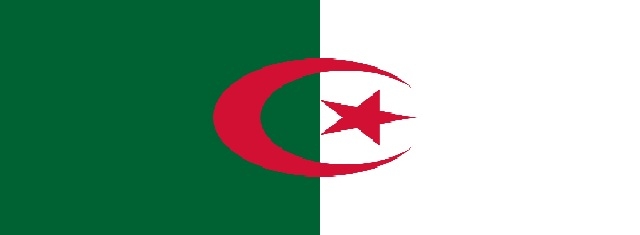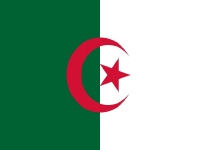Travel
ALGERIA with its Unique and Diverse Culture and Tradition
Influenced by recent history

ALGERIA FLAG
Algeria's culture is strongly influenced by the country's recent history, as well as other aspects such as their literature, music, arts, crafts and religion. Arabic is Algeria's primary language and is spoken by around 82% of the populace. The French colonialism experienced by the country in the past has resulted in French being the second language of many educated Algerians, and English is very rarely spoken. Many people of Algeria also speak different dialects of Berber.
Islam is the official religion of Algeria and the majority of Algerians are Muslims. Since the departure of the French, Christianity is a secondary religion. Approximately one percent of Algeria's population is Jewish. Algerian literature is split between French and Arabic and the country has produced a number of famous novelists, Mohammed Dib, Kateb Yacine and Assia Djebar, during the 20th century. Assia Djebar's works are widely translated.
The musical genre of Algeria that is best known abroad is Rai. Rai is a pop-flavored, opinionated take on folk music, featuring stars such as Khaled and Cheb Mami.
The musical genre of Algeria that is best known abroad is Rai. Rai is a pop-flavored, opinionated take on folk music, featuring stars such as Khaled and Cheb Mami.
Chaabi style music also remains very popular with stars such as El Hadj El Anka and Dahmane El Harrachi making their mark on the local music scene. For those with a more classical taste in music, Andalusi music, brought from Al-Andalus by Morisco refugees, is preserved in many older coastal towns. Algeria has a thriving handicrafts industry. Part of the charm of the country is the richness of its production. From carpets to ceramics, from leather to lute making, from pottery to glass working to silverwork, the country has a tremendous variety of skills that produce goods which are sold in many other countries as well as to visiting tourists
Algeria's official language is Arabic, which is spoken by an estimated 81% of the population. All official documents are printed in Arabic and those from non-Arab households usually learn the language in school. Arabic has been the official language of the country since 1963. More recently, Berber has become recognized as one of the country's national languages. This occurred in 2002 and is an appropriate step since 99% of the population speaks Arabic, Berber or both. Although being introduced in French-colonial times, and still often taught in schools and used in government and higher education, French has no official status in Algeria.
Algerian Arabic is somewhat different to the Arabic commonly spoken in other parts of the world. The language has been greatly influenced by Berber, Turkish and French from which it has many borrowed words.
Since the country has virtually always been a crossroads between east and west, it has seen many different cultural and architectural influences over the years. In ancient times, Algeria's strategic position meant that the major military powers of the time would do their utmost to gain control over it. As a result, Algeria has seen Phoenician, Roman, Vandal, Byzantine, Arab, Turk and French invasion, each leaving their own distinctive influence on the country.
Since the country has virtually always been a crossroads between east and west, it has seen many different cultural and architectural influences over the years. In ancient times, Algeria's strategic position meant that the major military powers of the time would do their utmost to gain control over it. As a result, Algeria has seen Phoenician, Roman, Vandal, Byzantine, Arab, Turk and French invasion, each leaving their own distinctive influence on the country.
With each conquest, new buildings where constructed and changes where made to government. Whilst not all these ancient cultures have a significantly notable bearing on the architecture in Algeria today, there are a few who have. The most notable is that of the Arab invasions which has perhaps had the most lasting and extensive effect. There are, however, signs of other cultures all over the country - from Phoenician road signs to ancient Roman ruins or French-speaking Arabs.
Most find that the best place to start a tour of the country's architecture is in Algiers. The city was founded over a thousand years ago and has seen beautiful ancient masterpieces survive alongside somewhat newer additions. Once you've seen all you can in Algiers, you might try a tour of the surrounding towns as you head out towards Timgad. Timgad features a number of beautiful and important Roman ruins.
Other interesting architecture in Algeria features French-colonial style fortresses, unique rounded mud-huts in rural areas and ancient colossal Arab-styled homes. Mosques and other religious buildings also tend to show interesting trends in architecture.
Times gone by have seen the inhabitants of the country speak Phoenician and Turkish though both languages are no longer in use here. There are a number of other African languages that exist in the country, but these account for a very small portion of the population.
Source : Algeria Channel
Ruby BIRD
http://www.portfolio.uspa24.com/
Yasmina BEDDOU
http://www.yasmina-beddou.uspa24.com/
Times gone by have seen the inhabitants of the country speak Phoenician and Turkish though both languages are no longer in use here. There are a number of other African languages that exist in the country, but these account for a very small portion of the population.
Source : Algeria Channel
Ruby BIRD
http://www.portfolio.uspa24.com/
Yasmina BEDDOU
http://www.yasmina-beddou.uspa24.com/
Ruby Bird Yasmina Beddou Algiers Algeria Strongly Influenced Recent History Literature Music Arts Crafts Religion French Colonisation Populace Country Algerians
Liability for this article lies with the author, who also holds the copyright. Editorial content from USPA may be quoted on other websites as long as the quote comprises no more than 5% of the entire text, is marked as such and the source is named (via hyperlink).






